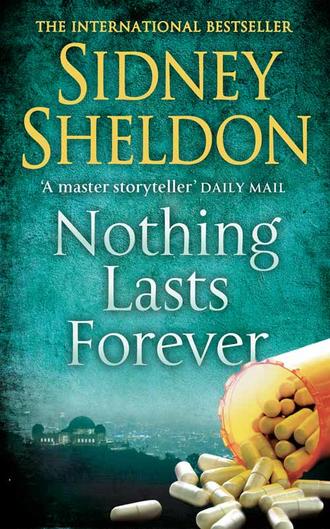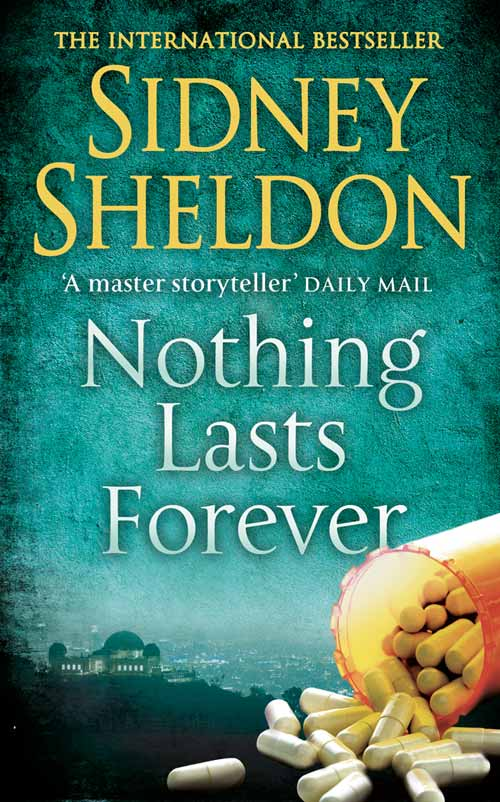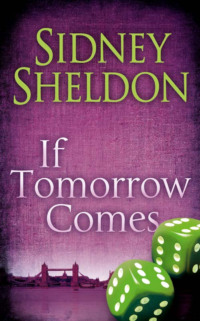
Полная версия
Nothing Lasts Forever


SIDNEY
SHELDON
NOTHING LASTS
FOREVER

Copyright
HarperFiction
An imprint of HarperCollinsPublishers
1 London Bridge Street
London SE1 9GF
www.harpercollins.co.uk
Copyright © 1994 by Sidney Sheldon
A catalogue record for this book is available from the British Library
All rights reserved under International and Pan-American Copyright Conventions. By payment of the required fees, you have been granted the non-exclusive, non-transferable right to access and read the text of this e-book on-screen. No part of this text may be reproduced, transmitted, down-loaded, decompiled, reverse engineered, or stored in or introduced into any information storage and retrieval system, in any form or by any means, whether electronic or mechanical, now known or hereinafter invented, without the express written permission of HarperCollins e-books.
HarperCollinsPublishers has made every reasonable effort to ensure that any picture content and written content in this ebook has been included or removed in accordance with the contractual and technological constraints in operation at the time of publication.
Source ISBN: 9780006476580
Ebook Edition © JUNE 2012 ISBN: 9780007383962
Version: 2018-07-31
TO ANASTASIA AND RODERICK MANN, WITH LOVE
Table of Contents
Title Page
Copyright
Dedication
Prologue
Part One
Chapter One
Chapter Two
Chapter Three
Chapter Four
Chapter Five
Chapter Six
Chapter Seven
Chapter Eight
Chapter Nine
Chapter Ten
Chapter Eleven
Chapter Twelve
Chapter Thirteen
Part Two
Chapter Fourteen
Chapter Fifteen
Chapter Sixteen
Chapter Seventeen
Chapter Eighteen
Chapter Nineteen
Chapter Twenty
Chapter Twenty-one
Chapter Twenty-two
Chapter Twenty-three
Chapter Twenty-four
Chapter Twenty-five
Chapter Twenty-six
Chapter Twenty-seven
Chapter Twenty-eight
Chapter Twenty-nine
Chapter Thirty
Chapter Thirty-one
Chapter Thirty-two
Chapter Thirty-three
Chapter Thirty-four
Chapter Thirty-five
Chapter Thirty-six
Chapter Thirty-seven
Epilogue
Books by Sidney Sheldon
About the Author
About the Publisher
Prologue
San Francisco Spring 1995
District Attorney Carl Andrews was in a fury. “What the hell is going on here?” he demanded. “We have three doctors living together and working at the same hospital. One of them almost gets an entire hospital closed down, the second one kills a patient for a million dollars, and the third one is murdered.”
Andrews stopped to take a deep breath. “And they’re all women! Three goddam women doctors! The media is treating them like celebrities. They’re all over the tube. 60 Minutes did a segment on them. Barbara Walters did a special on them. I can’t pick up a newspaper or magazine without seeing their pictures, or reading about them. Two to one, Hollywood is going to make a movie about them, and they’ll turn the bitches into some kind of heroines! I wouldn’t be surprised if the government put their faces on postage stamps, like Presley. Well, by God, I won’t have it!” He slammed a fist down against the photograph of a woman on the cover of Time magazine. The caption read: “Dr. Paige Taylor—Angel of Mercy or the Devil’s Disciple?”
“Dr. Paige Taylor.” The district attorney’s voice was filled with disgust. He turned to Gus Venable, his chief prosecuting attorney. “I’m handing this trial over to you, Gus. I want a conviction. Murder One. The gas chamber.”
“Don’t worry,” Gus Venable said quietly. “I’ll see to it.”
Sitting in the courtroom watching Dr. Paige Taylor, Gus Venable thought: She’s jury-proof. Then he smiled to himself. No one is jury-proof. She was tall and slender, with eyes that were a startling dark brown in her pale face. A disinterested observer would have dismissed her as an attractive woman. A more observant one would have noticed something else—that all the different phases of her life coexisted in her. There was the happy excitement of the child, superimposed onto the shy uncertainty of the adolescent and the wisdom and pain of the woman. There was a look of innocence about her. She’s the kind of girl, Gus Venable thought cynically, a man would be proud to take home to his mother. If his mother had a taste for cold-blooded killers.
There was an almost eerie sense of remoteness in her eyes, a look that said that Dr. Paige Taylor had retreated deep inside herself to a different place, a different time, far from the cold, sterile courtroom where she was trapped.
The trial was taking place in the venerable old San Francisco Hall of Justice on Bryant Street. The building, which housed the Superior Court and County Jail, was a forbidding-looking edifice, seven stories high, made of square gray stone. Visitors arriving at the courthouse were funneled through electronic security checkpoints. Upstairs, on the third floor, was the Superior Court. In Courtroom 121, where murder trials were held, the judge’s bench stood against the rear wall, with an American flag behind it. To the left of the bench was the jury box, and in the center were two tables separated by an aisle, one for the prosecuting attorney, the other for the defense attorney.
The courtroom was packed with reporters and the type of spectators attracted to fatal highway accidents and murder trials. As murder trials went, this one was spectacular. Gus Venable, the prosecuting attorney, was a show in himself. He was a burly man, larger than life, with a mane of gray hair, a goatee, and the courtly manner of a Southern plantation owner. He had never been to the South. He had an air of vague bewilderment and the brain of a computer. His trademark, summer and winter, was a white suit, with an old-fashioned stiff-collar shirt.
Paige Taylor’s attorney, Alan Penn, was Venable’s opposite, a compact, energetic shark, who had built a reputation for racking up acquittals for his clients.
The two men had faced each other before, and their relationship was one of grudging respect and total mistrust. To Venable’s surprise, Alan Penn had come to see him the week before the trial was to begin.
“I came here to do you a favor, Gus.”
Beware of defense attorneys bearing gifts. “What did you have in mind, Alan?”
“Now understand—I haven’t discussed this with my client yet, but suppose—just suppose—I could persuade her to plead guilty to a reduced charge and save the State the cost of a trial?”
“Are you asking me to plea-bargain?”
“Yes.”
Gus Venable reached down to his desk, searching for something. “I can’t find my damn calendar. Do you know what the date is?”
“June first. Why?”
“For a minute there, I thought it must be Christmas already, or you wouldn’t be asking for a present like that.”
“Gus …”
Venable leaned forward in his chair. “You know, Alan, ordinarily, I’d be inclined to go along with you. Tell you the truth, I’d like to be in Alaska fishing right now. But the answer is no. You’re defending a cold-blooded killer who murdered a helpless patient for his money. I’m demanding the death penalty.”
“I think she’s innocent, and I—”
Venable gave a short, explosive laugh. “No, you don’t. And neither does anyone else. It’s an open-and-shut case. Your client is as guilty as Cain.”
“Not until the jury says so, Gus.”
“They will.” He paused. “They will.”
After Alan Penn left, Gus Venable sat there thinking about their conversation. Penn’s coming to him was a sign of weakness. Penn knew there was no chance he could win the trial. Gus Venable thought about the irrefutable evidence he had, and the witnesses he was going to call, and he was satisfied.
There was no question about it. Dr. Paige Taylor was going to the gas chamber.
It had not been easy to impanel a jury. The case had occupied the headlines for months. The cold-bloodedness of the murder had created a tidal wave of anger.
The presiding judge was Vanessa Young, a tough, brilliant black jurist rumored to be the next nominee for the United States Supreme Court. She was not known for being patient with lawyers, and she had a quick temper. There was an adage among San Francisco trial lawyers: If your client is guilty, and you’re looking for mercy, stay away from Judge Young’s courtroom.
The day before the start of the trial, Judge Young had summoned the two attorneys to her chambers.
“We’re going to set some ground rules, gentlemen. Because of the serious nature of this trial, I’m willing to make certain allowances to make sure that the defendant gets a fair trial. But I’m warning both of you not to try to take advantage of that. Is that clear?”
“Yes, your honor.”
“Yes, your honor.”
Gus Venable was finishing his opening statement. “And so, ladies and gentlemen of the jury, the State will prove—yes, prove beyond a reasonable doubt—that Dr. Paige Taylor killed her patient, John Cronin. And not only did she commit murder, she did it for money … a lot of money. She killed John Cronin for one million dollars.
“Believe me, after you’ve heard all the evidence, you will have no trouble in finding Dr. Paige Taylor guilty of murder in the first degree. Thank you.”
The jury sat in silence, unmoved but expectant.
Gus Venable turned to the judge. “If it please your honor, I would like to call Gary Williams as the State’s first witness.”
When the witness was sworn in, Gus Venable said, “You’re an orderly at Embarcadero County Hospital?”
“Yes, that’s right.”
“Were you working in Ward Three when John Cronin was brought in last year?”
“Yes.”
“Can you tell us who the doctor in charge of his case was?”
“Dr. Taylor.”
“How would you characterize the relationship between Dr. Taylor and John Cronin?”
“Objection!” Alan Penn was on his feet. “He’s calling for a conclusion from the witness.”
“Sustained.”
“Let me phrase it another way. Did you ever hear any conversations between Dr. Taylor and John Cronin?”
“Oh, sure. I couldn’t help it. I worked that ward all the time.”
“Would you describe those conversations as friendly?”
“No, sir.”
“Really? Why do you say that?”
“Well, I remember the first day Mr. Cronin was brought in, and Dr. Taylor started to examine him, he said to keep her …” He hesitated. “I don’t know if I can repeat his language.”
“Go ahead, Mr. Williams. I don’t think there are any children in this courtroom.”
“Well, he told her to keep her fucking hands off him.”
“He said that to Dr. Taylor?”
“Yes, sir.”
“Please tell the court what else you may have seen or heard.”
“Well, he always called her ‘that bitch.’ He didn’t want her to go near him. Whenever she came into his room, he would say things like ‘Here comes that bitch again!’ and ‘Tell that bitch to leave me alone’ and ‘Why don’t they get me a real doctor?’”
Gus Venable paused to look over to where Dr. Taylor was seated. The jurors’ eyes followed him. Venable shook his head, as though saddened, then turned back to the witness. “Did Mr. Cronin seem to you to be a man who wanted to give a million dollars to Dr. Taylor?”
Alan Penn was on his feet again. “Objection! He’s calling for an opinion again.”
Judge Young said, “Overruled. The witness may answer the question.”
Alan Penn looked at Paige Taylor and sank back in his seat.
“Hell, no. He hated her guts.”
Dr. Arthur Kane was in the witness box.
Gus Venable said, “Dr. Kane, you were the staff doctor in charge when it was discovered that John Cronin was mur—” He looked at Judge Young. “… killed by insulin being introduced into his IV. Is that correct?”
“It is.”
“And you subsequently discovered that Dr. Taylor was responsible.”
“That’s correct.”
“Dr. Kane, I’m going to show you the official hospital death form signed by Dr. Taylor.” He picked up a paper and handed it to Kane. “Would you read it aloud, please?”
Kane began to read. “ ‘John Cronin. Cause of Death: Respiratory arrest occurred as a complication of myocardial infarction occurring as a complication of pulmonary embolus.’ ”
“And in layman’s language?”
“The report says that the patient died of a heart attack.”
“And that paper is signed by Dr. Taylor?”
“Yes.”
“Dr. Kane, was that the true cause of John Cronin’s death?”
“No. The insulin injection caused his death.”
“So, Dr. Taylor administered a fatal dose of insulin and then falsified the report?”
“Yes.”
“And you reported it to Dr. Wallace, the hospital administrator, who then reported it to the authorities?”
“Yes. I felt it was my duty.” His voice rang with righteous indignation. “I’m a doctor. I don’t believe in taking the life of another human being under any circumstances.”
The next witness called was John Cronin’s widow. Hazel Cronin was in her late thirties, with flaming red hair, and a voluptuous figure that her plain black dress failed to conceal.
Gus Venable said, “I know how painful this is for you, Mrs. Cronin, but I must ask you to describe to the jury your relationship with your late husband.”
The widow Cronin dabbed at her eyes with a large lace handkerchief. “John and I had a loving marriage. He was a wonderful man. He often told me I had brought him the only real happiness he had ever known.”
“How long were you married to John Cronin?”
“Two years, but John always said it was like two years in heaven.”
“Mrs. Cronin, did your husband ever discuss Dr. Taylor with you? Tell you what a great doctor he thought she was? Or how helpful she had been to him? Or how much he liked her?”
“He never mentioned her.”
“Never?”
“Never.”
“Did John ever discuss cutting you and your brothers out of his will?”
“Absolutely not. He was the most generous man in the world. He always told me that there was nothing I couldn’t have, and that when he died …” Her voice broke. “… that when he died, I would be a wealthy woman, and …” She could not go on.
Judge Young said, “We’ll have a fifteen-minute recess.”
Seated in the back of the courtroom, Jason Curtis was filled with anger. He could not believe what the witnesses were saying about Paige. This is the woman I love, he thought. The woman I’m going to marry.
Immediately after Paige’s arrest, Jason Curtis had gone to visit her in jail.
“We’ll fight this,” he assured her. “I’ll get you the best criminal lawyer in the country.” A name immediately sprang to mind. Alan Penn. Jason had gone to see him.
“I’ve been following the case in the papers,” Penn said. “The press has already tried and convicted her of murdering John Cronin for a bundle. What’s more, she admits she killed him.”
“I know her,” Jason Curtis told him. “Believe me, there’s no way Paige could have done what she did for money.”
“Since she admits she killed him,” Penn said, “what we’re dealing with here then is euthanasia. Mercy killings are against the law in California, as in most states, but there are a lot of mixed feelings about them. I can make a pretty good case for Florence Nightingale listening to a Higher Voice and all that shit, but the problem is that your lady love killed a patient who left her a million dollars in his will. Which came first, the chicken or the egg? Did she know about the million before she killed him, or after?”
“Paige didn’t know a thing about the money,” Jason said firmly.
Penn’s tone was noncommittal. “Right. It was just a happy coincidence. The DA is calling for Murder One, and he wants the death penalty.”
“Will you take the case?”
Penn hesitated. It was obvious that Jason Curtis believed in Dr. Taylor. The way Samson believed in Delilah. He looked at Jason and thought: I wonder if the poor son of a bitch had a haircut and doesn’t know it.
Jason was waiting for an answer.
“Ill take the case, as long as you know it’s all uphill. It’s going to be a tough one to win.”
Alan Penn’s statement turned out to be overly optimistic.
When the trial resumed the following morning, Gus Venable called a string of new witnesses.
A nurse was on the stand. “I heard John Cronin say, ‘I know I’ll die on the operating table. You’re going to kill me. I hope they get you for murder.’ ”
An attorney, Roderick Pelham, was on the stand. Gus Venable said, “When you told Dr. Taylor about the million dollars from John Cronin’s estate, what did she say?”
“She said something like ‘It seems unethical. He was my patient.’ ”
“She admitted it was unethical?”
“Yes.”
“But she agreed to take the money?”
“Oh, yes. Absolutely.”
Alan Penn was cross-examining.
“Mr. Pelham, was Dr. Taylor expecting your visit?”
“Why, no, I …”
“You didn’t call her and say, ‘John Cronin left you one million dollars’?”
“No. I …”
“So when you told her, you were actually face-to-face with her?”
“Yes.”
“In a position to see her reaction to the news?”
“Yes.”
“And when you told her about the money, how did she react?”
“Well—she—she seemed surprised, but …”
“Thank you Mr. Pelham. That’s all.”
The trial was now in its fourth week. The spectators and press had found the prosecuting attorney and defense attorney fascinating to watch. Gus Venable was dressed in white and Alan Penn in black, and the two of them had moved around the courtroom like players in a deadly, choreographed game of chess, with Paige Taylor the sacrificial pawn.
Gus Venable was tying up the loose ends.
“If the court please, I would like to call Alma Rogers to the witness stand.”
When his witness was sworn in, Venable said, “Mrs. Rogers, what is your occupation?”
“It’s Miss Rogers.”
“I do beg your pardon.”
“I work at the Corniche Travel Agency.”
“Your agency books tours to various countries and makes hotel reservations and handles other accommodations for your clients?”
“Yes, sir.”
“I want you to take a look at the defendant. Have you ever seen her before?”
“Oh, yes. She came into our travel agency two or three years ago.”
“And what did she want?”
“She said she was interested in a trip to London and Paris and, I believe, Venice.”
“Did she ask about package tours?”
“Oh, no. She said she wanted everything first class—plane, hotel. And I believe she was interested in chartering a yacht.”
The courtroom was hushed. Gus Venable walked over to the prosecutor’s table and held up some folders. “The police found these brochures in Dr. Taylor’s apartment. These are travel itineraries to Paris and London and Venice, brochures for expensive hotels and airlines, and one listing the cost of chartering a private yacht.”
There was a loud murmur from the courtroom.
The prosecutor had opened one of the brochures.
“Here are some of the yachts listed for charter,” he read aloud. “The Christina O … twenty-six thousand dollars a week plus ship’s expenses … the Resolute Time, twenty-four thousand five hundred dollars a week … the Lucky Dream, twenty-seven thousand three hundred dollars a week.“ He looked up. ”There’s a check mark after the Lucky Dream. Paige Taylor had already selected the twenty-seven-thousand-three-hundred-a-week yacht. She just hadn’t selected her victim yet.
“We’d like to have these marked Exhibit A.” Venable turned to Alan Penn and smiled. Alan Penn looked at Paige. She was staring down at the table, her face pale. “Your witness.”
Penn rose to his feet, stalling, thinking fast.
“How is the travel business these days, Miss Rogers?”
“I beg your pardon?”
“I asked how business was. Is Corniche a large travel agency?”
“It’s quite large, yes.”
“I imagine a lot of people come in to inquire about trips.”
“Oh, yes.”
“Would you say five or six people a day?”
“Oh, no!” Her voice was indignant. “We talk to as many as fifty people a day about travel arrangements.”
“Fifty people a day?” He sounded impressed. “And the day we’re talking about was two or three years ago. If you multiply fifty by nine hundred days, that’s roughly forty-five thousand people.”
“I suppose so.”
“And yet, out of all those people, you remembered Dr. Taylor. Why is that?”
“Well, she and her two friends were so excited about taking a trip to Europe. I thought it was lovely. They were like schoolgirls. Oh, yes. I remember them very clearly, particularly because they didn’t look like they could afford a yacht.”
“I see. I suppose everyone who comes in and asks for a brochure goes away on a trip?”
“Well, of course not. But—”
“Dr. Taylor didn’t actually book a trip, did she?”
“Well, no. Not with us. She—”
“Nor with anyone else. She merely asked to see some brochures.”
“Yes. She—”
“That’s not the same as going to Paris or London, is it?”
“Well, no, but—”
“Thank you. You may step down.”
Venable turned to Judge Young. “I would like to call Dr. Benjamin Wallace to the stand …”
“Dr. Wallace, you’re in charge of administration at Embarcadero County Hospital?”
“Yes.”
“So, of course, you’re familiar with Dr. Taylor and her work?”
“Yes, I am.”
“Were you surprised to learn that Dr. Taylor was indicted for murder?”
Penn was on his feet. “Objection, your honor. Dr. Wallace’s answer would be irrelevant.”
“If I may explain,” interrupted Venable. “It could be very relevant if you’ll just let me …”
“Well, let’s see what develops,” said Judge Young. “But no nonsense, Mr. Venable.”
“Let me approach the question differently,” continued Venable. “Dr. Wallace, every physician is required to take the Hippocratic Oath, is that not so?”
“Yes.”
“And part of that oath is”—the prosecutor read from a paper in his hand—“ ‘that I shall abstain from every act of mischief or corruption’?”
“Yes.”
“Was there anything Dr. Taylor did in the past that made you believe she was capable of breaking her Hippocratic Oath?”
“Objection.”








